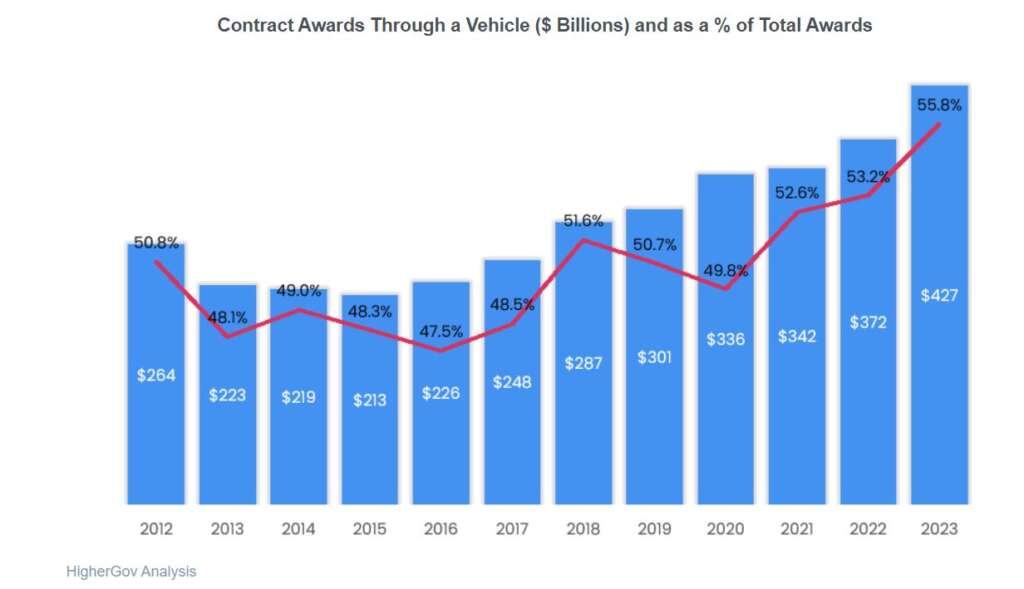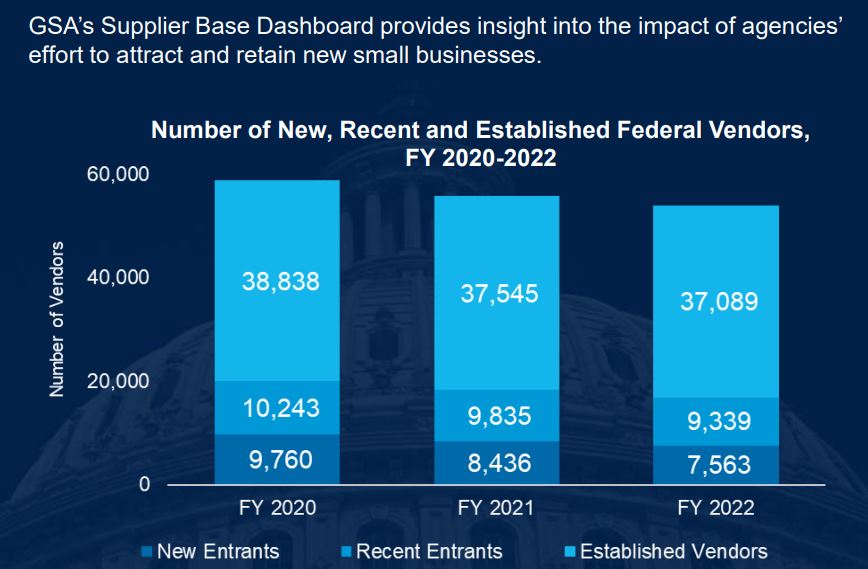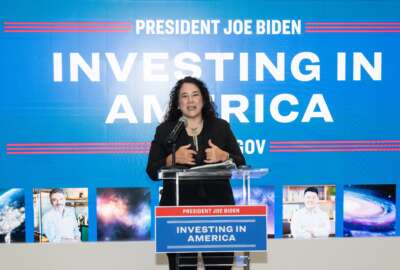OFPP expands small business ‘rule of two’ to multiple award contracts
The Office of Federal Procurement Policy issued a new memo outlining several specific steps for how agencies can increase the number of small business awards un...
With spending against governmentwide acquisition contracts reaching an all-time high in fiscal 2023, the Office of Federal Procurement Policy is pushing agencies to make changes to ensure a healthy amount of small businesses participate on these vehicles.
In a new memo from OFPP, the Biden administration is telling agencies to take specific steps like on-ramps, applying the “rule of two” and even not using a “best-in-class” contracts should they be detrimental to small firms, when managing or buying from a multiple award contract.
“This guidance takes an important step in ensuring our diverse base of small businesses have opportunities in a greater diversity of acquisition strategies,” said Small Business Administration Administrator Isabel Casillas Guzman in a blog posted by the Office of Management and Budget today. “By taking advantage of the strategies in this guidance, the federal government will be able to increase the number of small business firms in the federal supplier base and increase contracting opportunities for small disadvantaged businesses (SDBs).”
OFPP also is encouraging better and more regular communications with both small businesses and with SBA’s Procurement Center Representatives (PCR) and the agency small business specialist in the development of multiple-award contracts.
“For these acquisitions, agency requirements and acquisition officials should invite the agency small business specialist and the SBA PCR to engage with the agency early in the acquisition planning process during the development of the acquisition plan,” the memo states. “Agencies should include in the acquisition plan rationale, including the market research undertaken, when a multiple-award contract would not be fully or partially set aside for small businesses, or when a reserve would not be used. The explanation should be reviewed by the agency small business specialist.”
OFPP’s memo comes as agencies have spent more money than ever with small businesses. In fiscal 2022, the administration says small businesses received nearly $163 billion in federal contracts, of which a record of nearly $70 billion went to small disadvantaged businesses (SDBs).
New data for 2023 from HigherGov, a market intelligence firm, show the use of multiple award contracts continued to grow. The company says almost 55.8% of all awards went through a contract vehicle with the General Services Administration’s OASIS and NASA’s SEWP V seeing record awards of $13.4 billion and $10.5 billion, respectively. GSA says its schedules contract saw a record $46 billion in sales last year, a $4.6 billion increase over 2022.

Additionally, OFPP’s push for agencies to use one of the “best-in-class” contracts like SEWP V or OASIS — there are 38 BICs in all — saw more spending across these multiple-award contracts. Deltek, another market research firm, found agencies spent more than 54 billion dollars, or 12.7%, of all procurement on BICs. This is up from $37.6 billion in 2019.
And despite small firms generally doing well under best-in-class with small business utilization holding steady at 38% between 2018 and 2022, the number of small contractors continues to decline. SBA highlighted this problem in May. It said agencies since 2010 have seen about a 40% decrease in the number of small businesses receiving prime contract awards. Over the same period of time, the number of small companies doing business with the federal government for the first time has decreased by about 60% — and over the past 15 years, new entrants have dropped by approximately 80%.
Deltek found there are 1,800 fewer small business contractors in 2022 as compared to 2020, using GSA’s supplier base dashboard. Deltek also says what is worse is the number of new entrants into the federal market as defined by having won a single prime contract or less in the last three years dropped 2,200 over the last three years.

The fact is that while the small business percentages look healthy, especially with BICs, it’s a smaller group of vendors winning contracts, which is part of the problem OFPP is trying to address in with this new guidance.
“This is a crucial step in supporting a diverse and resilient federal marketplace, driving cost savings, and improving the overall supply chain. The new actions announced by the Biden-Harris administration will have a significant impact on expanding small businesses’ access to federal contracts,” Christine Harada, the senior advisor in OFPP, wrote on a post on LinkedIN.
As a backdrop to the memo, House lawmakers over the last two weeks are turning their attention to a growing body of concerns about how small businesses are figuring in new large ceiling-value multiple award contracts from NASA and the Veterans Affairs Department. House Small Business Committee leaders wrote to NASA on Jan. 12 about the small business size standard it’s planning on using on the SEWP VI GWAC. Then on Thursday, House Veterans Affairs Committee leaders wrote to VA seeking details about the agency’s decision not increase the number of small business awardees even more under its Transformation Twenty-One Total Technology Next Generation 2 (T4NG2) contract vehicle.
The memo also comes ahead of new rules in the Federal Acquisition Regulations. OFPP says the FAR Council and SBA are developing proposed regulatory amendments to address the steps outlined in the memo.
“In advance of any finalization of such regulatory amendments, which will be subject to notice and comment, OFPP encourages early agency adoption of these management steps, which can help agencies in meeting the SDB contracting goal they negotiated with SBA for 2024 in accordance with OMB Memorandum M-24-01,” the memo states.
Among the biggest impending changes is the application of the “rule of two” to multiple award contracts. Under FAR Part 19 and 13 CFR, the “rule of two” requires that an acquisition shall be set aside for small business concerns whenever there is reasonable expectation that offers will be obtained from at least two responsible small business concerns and award will be made at fair market prices.
Major change to ‘rule of two’
For the first time, the memo is applying this concept broadly across multiple award contracts.
“Except for orders citing an exception to competition (FAR § 16.505(b)(2), exceptions to fair opportunity, or agency procedures that reflect an appropriate exception), agencies should set aside orders over the micro-purchase threshold (MPT) for small business contract holders when the contracting officer determines there is a reasonable expectation of obtaining offers from two or more small business contract holders under the multiple-award contract that are competitive in terms of market prices, quality, and delivery,” the memo states. “If not using an order set aside, including on multiple-award contracts that have no or only one small business contract holder, the contracting officer should document the basis for the determination in accordance with agency procedures.”
That documentation also should include specifics about the agency’s market research efforts, including research of small firms not on multiple-award contracts and why it decided to use the specific vehicle, and share that documentation with the agency’s small business specialist, giving them time to review and respond.
“The small business specialist should notify the PCR for any non-set-aside order over a threshold negotiated between the agency and SBA,” the memo added.
Larry Allen, president of Allen Federal Business Partners, expressed deep concerns over the “rule of two” changes.
“This memo upends over 30 years of established policy. OMB ruled several years ago that the rule of two would be applied at the contract, not task order level. There was also language in the legislative report accompanying the Federal Acquisition Streamlining Act (FASA) that made it clear that the increase in the small business acquisition threshold included in that bill did, in no way, change the procurement preferences outlined in FAR 8.4,” Allen wrote in an email to Federal News Network. “Government contractors have invested millions in indefinite delivery, indefinite quantity (IDIQ) contracts as they are fast and easy ways to buy. Where should those businesses go to get their money back? This administration touts transparency, but this is a major, substantial policy shift that no one outside of OMB or SBA apparently knew about. How can industry think that the administration is serious about transparency and wanting to work as partners when it changes the rules without even going through a rule making before doing it? How can OMB people who have worked with industry for years look them in the eye anymore?”
As part of this overall effort, OFPP says it will be working with GSA’s the Office of Shared Solutions and Performance Improvements and the SBA to create a standard reporting tool for agencies to track and manage how they are meeting the goals of the memo.
“In addition, OMB and SBA will work together to identify priorities for supply-chain strengthening where improvements can be made, as evidenced by data indicating that small businesses are underrepresented in a federal market segment relative to the economy at large, that dollars are heavily concentrated in a small number of market participants, or that the percentage of dollars going to small businesses is significantly higher through the open market than through multiple-award contracts,” the memo stated.
The memo also follows a series of efforts OFPP kicked off in 2021 to address small business contracting. In June 2021, President Joe Biden issued an executive order to increase contracting spending on small disadvantaged businesses by 50% over the next five years, to reach 15% of all prime contracts by 2025.
Last February it launched two tools, a supplier base dashboard and a procurement equity tool, to help agencies find potential firms to replenishment the industrial base and compete for federal work.
Copyright © 2024 Federal News Network. All rights reserved. This website is not intended for users located within the European Economic Area.
Jason Miller is executive editor of Federal News Network and directs news coverage on the people, policy and programs of the federal government.
Follow @jmillerWFED







